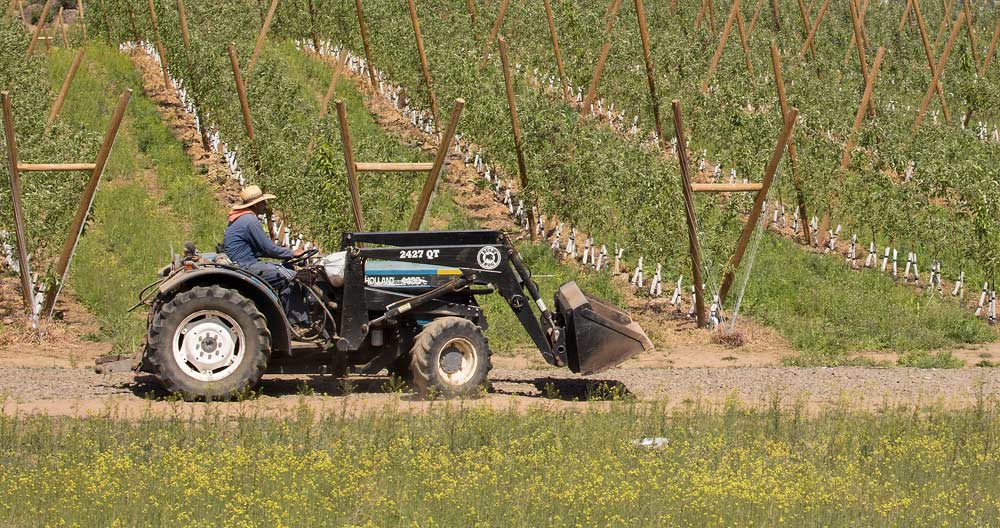
A worker moves a tractor across several Naches, Washington, area blocks in the spring of 2015. (TJ Mullinax/Good Fruit Grower file photo)
The legal vagaries of piece-rate compensation will continue Sept. 14 when Washington’s Supreme Court hears arguments about whether growers should have to pay their workers separately for meetings, traveling to and from orchards and other forms of “unproductive time.”
Using their 2015 rest break victory as a precedent, attorneys representing orchard workers contend that farm employees paid by the piece are owed a separately calculated hourly wage for required duties not directly related with production, especially those of which they can’t control the pace.
Last year, Mariano Carranza and Eliseo Martinez, represented by Seattle attorneys, filed a class action lawsuit against their employer Dovex Fruit Company of Wenatchee in U.S. District Court for allegedly violating a variety of state employment laws and the federal Migrant and Seasonal Agricultural Worker Protection Act. The attorneys estimate about 800 workers would qualify for the defendant class, according to court records.
Among the complaints was that Dovex paid only piece-rate wages that did not account for the time workers spent on chores not directly related to picking, such as meetings, maintaining equipment or hauling ladders to a trailer. Attorneys have called this type of work “unproductive time.” A federal judge certified the question to the Washington Supreme Court.
Dovex’s attorneys counter in court briefs that such periods of the day are factored into their workers’ piece-rate wages and that calculating separately for everything their employees do is nigh impossible. If workers end up receiving less than the state minimum wage, the company pays the difference, as required by law, they said. They consider the lawsuit a shot at the practice of piece-rate compensation in general, something the plaintiffs deny in another brief.
State Attorney General Bob Ferguson and farm labor advocate groups have filed a court brief in favor of the workers. The Washington State Tree Fruit Association and the Washington Trucking Association have done the same in favor of Dovex.
The Supreme Court case comes two years after the state Supreme Court ruled in favor of workers seeking hourly pay for their rest breaks separate from their piece-rate pay in a lawsuit against Sakuma Brothers Farms, a berry farm in Skagit County. The tree fruit industry has spent the past two years helping train orchardists how to comply with that ruling.
The Dovex case comes before the Justices at 1:30 p.m. on Sept. 14. Each side is allotted 20 minutes of argument. All state Supreme Court proceedings are live-streamed by TVW, the nonprofit public affairs broadcast network, at tvw.org.






Leave A Comment